

I was starting to head into the endgame portions of the tech and civic trees at this point, as my research pushed towards the Modern era and its later counterparts. I had finally exceeded the per-turn beaker output of the AI civs and was cutting into their tech lead in earnest now. However, my endless expansion and conquest of the Hattusa city state had soured diplomatic relations with everyone other than Alexander, and I expected trouble from the other civs before this game could be put to rest. There was still a long way to go before I had all of the components needed to finish the spaceship.

My next immediate objective was taking control of barbarian island and settling it for myself. This picture should provide a decent overview of what I was facing in terms of opposition, with the crossbow serving as the most formidable obstacle to seizing control of this small continent. I had landed my own crossbow a couple turns earlier, and it took too much damage for me to stay and fight. I had to evacuate it back to the mainland and land this knight instead. Fortunately barbarian units do not heal in Civ6, and so long as I could inflict steady damage on the barbs they would go down in time. Most of the pictured barbarians would end up suiciding themselves against my muskets once they landed. The ideal play here would have been to attack the barbarians with naval units and clear out a beachhead in that fashion, but my early coastal cities had all been on the inner sea and therefore my ships were trapped in that Mediterranean-like body of water. One additional disavantage of this variant is that any city not located directly on the coast can never build ships due to lack of Harbor districts.

I snuck out Angkor Wat from my capital as another wonder that the AI civs had ignored; I think that they skipped it because it requires an adjacent Aqueduct and the AI rarely builds them because they don't understand the Aqueduct placement rules. Angkor Wat has the property of increasing the population of all cities by one population point (like Hanging Gardens in Civ4) as well as adding one extra point of housing to all cities. Both of these were nice benefits, and my science swelled between turns from 192 to 213 beakers. I'd have a lot more population available to stuff into ziggurats once my builders could clear out the jungle/forest tiles and toss down more of the Sumerian unique tile improvement. There was a tradeoff though: all that extra population needed more amenities to stay happy. While I was trading for some luxuries with the AI civs, there weren't enough of them on the map to keep pace, and some of my cities began to fall into unhappiness. There was nothing I could do about it, as I wasn't going to stop expanding. I would have killed for just one Entertainment district, which would have allowed me to land the Colosseum with ease and get a zoo/stadium combo for lots of amenities. Unfortunately it wasn't allowed in this game.
For the moment I was still trading resources to the AI civs, picking up 360 gold and another 14 gold/turn from Alexander for a bunch of my excess luxuries. Pedro similarly signed on to a lucrative 22 gold/turn deal in exchange for resources that I wasn't using. Philip came back with a more interesting offer: he was willing to sell me the Iliad Great Work for my extra horses and coal. That sounded good to me and I happily picked up an extra 4 culture/turn from storing the work of literature in my palace. Then I noticed that we had this option available:

I had never signed a Research Agreement before in Civ6. It was highly worthwhile here though, as a completed Research Agreement would supply the tech boost for Chemistry while the specific agreement I was signing with Philip would land me the boost for Flight (it was highly unlikely that I was going to fulfill that requirement: build an Industrial era wonder). I would later sign a couple more of these with Alexander when there was a tech that we both could work on a Research Agreement together. The problem was that the main tech leaders amongst the AI civs were Pedro and Curtin, and neither of them liked my civ enough to sign a similar deal. This limited what I could do via up-front diplomacy.
Instead, I was doing my best to work them over with cloak and dagger skullduggery:

Which unfortunately wasn't always successful. This was a particularly painful failed dice roll because I really would have liked the boost for Rocketry, the tech that unlocks Spaceport districts. It's only boostable via spies and Great Scientists, which would have made this a perfect tech theft. Oh well. The theft odds were only 63% and I had succeeded on one tech theft and failed on one tech theft, which meant that the odds were holding more or less true. Unfortunately I would then fail my third tech theft again at the same odds which was indeed a bit unlucky. The odds of failing 2 out of 3 times (or all 3 times) were only about 30%, which was hardly outside the realm of probability but still a bit unlikely. Stealing the boost for Rocketry would have been quite helpful in terms of getting started on the actual spaceship construction sooner.
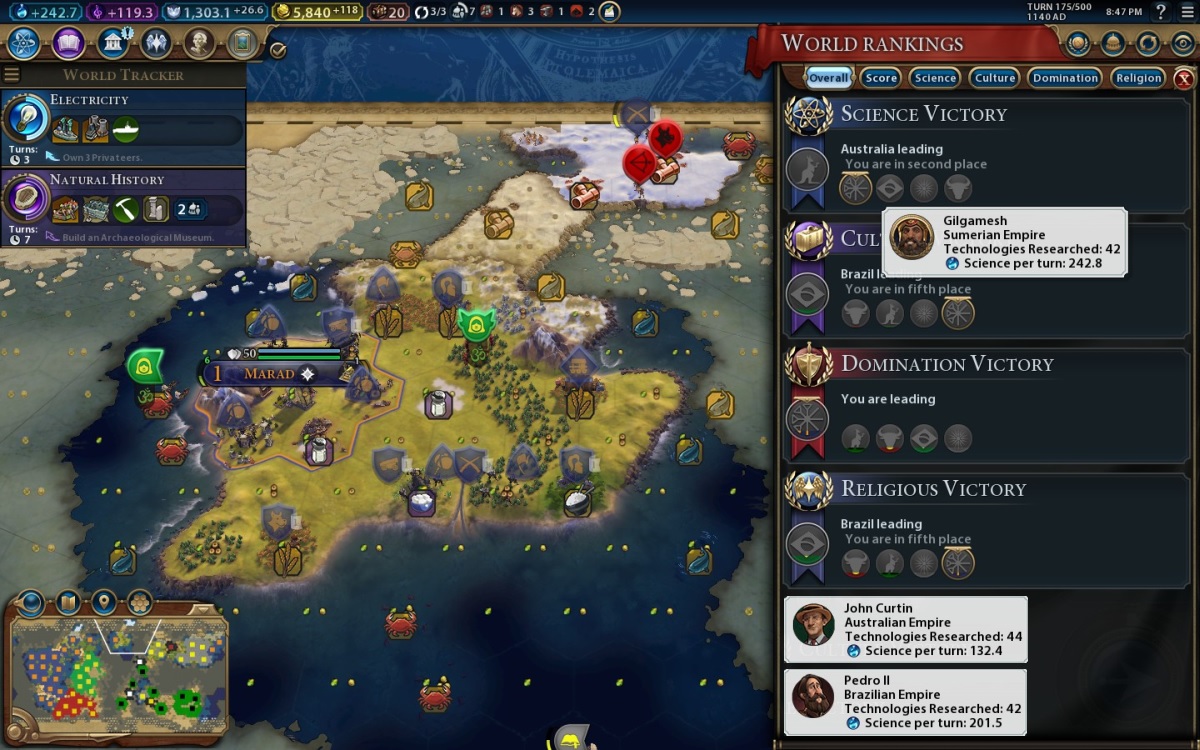
By Turn 175, I had cleared out the barbarians from all but the tip of the northeastern island and brought in three settlers to lay claim to the place. The first city had already been established and two more were shortly to follow. I thought that it would be worthwhile to settle another city in the extreme north to open up harvesting of the crabs and copper resources up there, but that could wait a little while longer. In terms of the tech race, I found myself in second place with a bit of a strange comparison to the AI civs. First of all, the gap had continued to shrink in terms of techs researched, as I was now even with Pedro and only two techs behind Curtin. This was the puzzling aspect, as Curtin somehow had the most techs researched despite a much weaker beaker output at only 132 per turn. I'm not sure how he managed to get ahead of the far superior Brazilian tech rate; perhaps he scored a useful Great Scientist and claimed a bunch of extra techs boosts? I know that Darwin was available in this game and one of the AIs picked him up, perhaps Curtin managed to get a thousand beakers for free through that method. In any case, the days when I was a distant trailer on the tech tree were over by this point. Sumeria's research output was clearly the best in the game, and even with many of the tech boosts unavailable the gap in total number of discovered techs was continuing to shrink.
Among the tech and civic boosts that were still possible to achieve under this variant, sometimes I found myself doing some funny stuff to land them:

Say hello to this terrifying army of scouts! Strength 27 on that thing, watch out.  For those who don't know, there's a boost associated with forming three corps (Mobilization civic). I could have sworn that there's also a boost for having three armies/armadas but I couldn't find it when I checked the list for this report. Maybe I was getting confused with the three corps requirement instead. Anyway, I found myself working to unlock as many of the lategame tech boosts as I could: building three privateers, building a coal mine, upgrading my swords into musketmen, and so on. The two cities that I settled next to Alexander's capital were also coming along nicely, with cattle resources for food and hills to mine and the flaground tiles given over to ziggurats.
For those who don't know, there's a boost associated with forming three corps (Mobilization civic). I could have sworn that there's also a boost for having three armies/armadas but I couldn't find it when I checked the list for this report. Maybe I was getting confused with the three corps requirement instead. Anyway, I found myself working to unlock as many of the lategame tech boosts as I could: building three privateers, building a coal mine, upgrading my swords into musketmen, and so on. The two cities that I settled next to Alexander's capital were also coming along nicely, with cattle resources for food and hills to mine and the flaground tiles given over to ziggurats.

Amazingly there was not a single land-based oil anywhere in my territory. I had half a dozen water-based sources of oil but none available on land. This was a problem because offshore oil wells aren't unlocked until reaching Plastics tech, and the boost for Plastics is to construct an oil well. Therefore it was worthwhile to settle this iceball location to the south of Australia because it was the only oil source that I could find. As a result, I now had offshore colonies sitting directly outside the capitals of both Macedonia and Australia, which could be difficult to defend if it came to a fight. Fortunately I could afford to lose Kutha once I claimed the boost for Plastics tech by throwing down an oil well; after that point the city didn't particularly matter any longer.
I finally achieved one of my biggest goals for the game on Turn 180: claiming the tech lead for myself:
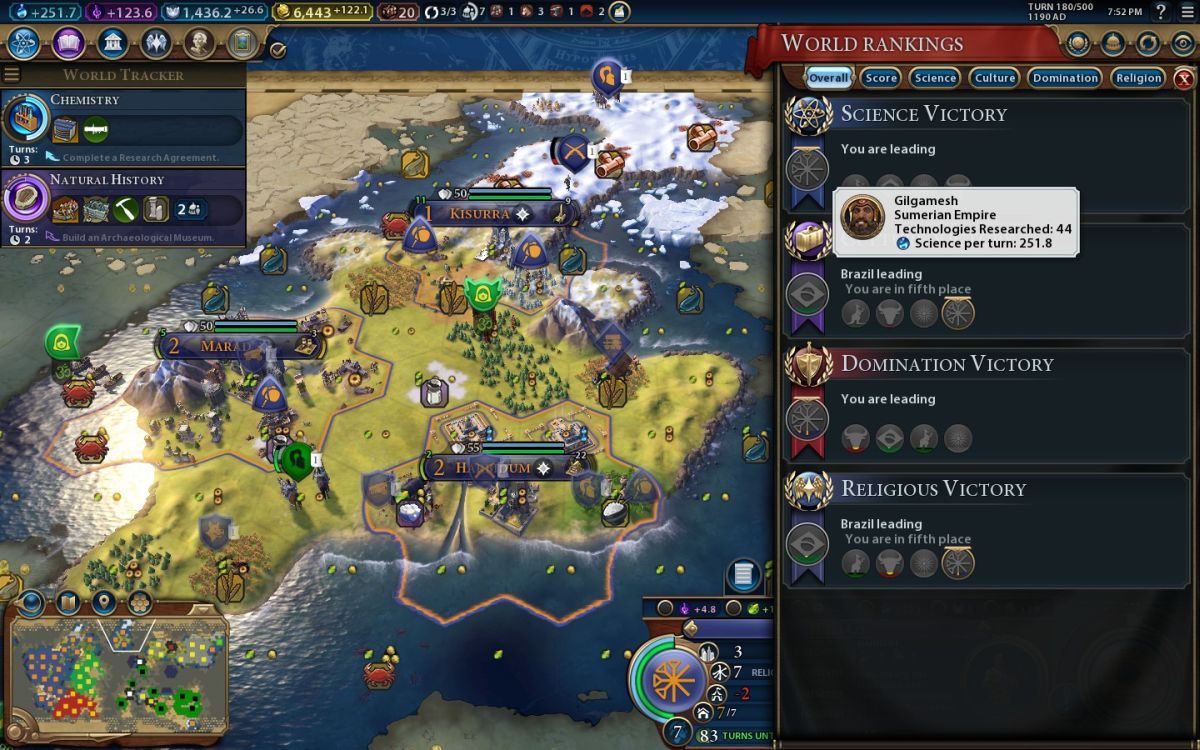
I passed the 250 beakers/turn mark at the same time that I occupied the first spot on the leaderboard. Technically I was tied with Curtin at 44 techs researched, however he was only making 131 beakers/turn and I was nearly doubling his research output. Sumeria had come a long way from the dark days when barbarians were raiding the capital city. My builders were still in the process of improving the northeast island, mining the hills and throwing down additional ziggurats on the plains tiles. It's too bad that ziggurats can't be built on hills or I would have tossed them down there as well! Also note that I remained in first place in military power, where I had been sitting for most of the game. This is a huge reason why Single Player is unsatisfying in Civ6: the AIs simply are not threatening, even at the highest difficulty level. Leave aside the fact that they're completely clueless at the tactical level and can't capture cities, ever. They don't even field large militaries! Try comparing that to Civ3 or Civ4, where the Deity AIs are stupid too but always have gigantic armies to throw at the player. I never felt scared of my AI competitors in this game, and with this being Deity, I should have been scared of them.

That observation is a perfect transition into the next phase of this report, as we were about to get a test run of exactly how not-formidable these AI civs were in the military realm. I was confronted with a double war declaration on Turn 182, with Pedro and Curtin leading the attack. Based on the movement of units, it looked like Brazil was the one launching the actual attack and Australia was pulled in via the joint war diplomatic option. Pedro had some legitimate beefs with me, as I had razed the city state (Hattusa) where he had been the suzerain and stolen his technological secrets via espionage. He also illogically became angry about "troops on the border" because I had my Great Merchant sitting next to one his cities. Come on, man! The other things were legit reasons to be angry but not that last one. In any case, Pedro sent several attackers towards my territory, a mixture of several submarines and AT crews along with random assorted older junk. He did not field any of the brokenly-overpowered Minas Gereases, for which I was quite grateful.
If I had to summarize my reaction to the dual war declarations, it was annoyance, not concern. The war declarations allowed Pedro and Curtin to weasel their way out of some significant gold/turn deals that had been ongoing, dropping my income by roughly 40 gold/turn. I was also forced to upgrade some of my older units to ensure my own safety, fortunately with Natural History civic completing on the same turn and allowing a free swap into Professional Army policy. (I had some very old civics like Theology stored at 1 turn away from completion for emergency policy swaps, which I would have used if needed.) The net effect of losing those gold payments and upgrading crossbows into more advanced (and expensive) field guns meant that my income fell noticeably. This truly did matter, as I needed to save up massive quantities of gold to patronage the endgame Great Scientists for use in the space race. It was something that I was keeping an eye on as Sumeria drew closer to the Atomic and Information ages.
By the way, my culture spiked enormously on the same turn that the wars broke out, from 128 culture/turn up over 200 culture/turn. What was the cause of that? It was the result of finishing Natural History civic:

This civic adds +1 culture to all ziggurats, causing the riverside ones to be worth 2 culture and the non-riverside ones (which previously lacked any culture at all) to be worth 1 culture. As you might imagine, I had a lot of ziggurats placed on the map by now. A lot. It was a pleasant feeling to look at the map and see all of those beautiful blue and purple colored beaker/culture symbols staring back at me from the ziggurat tile yields. Beyond its aesthetic value, the additional culture made a huge difference in terms of accelerating my civ through the remainder of the civics tree. It was important that I get to Globalization at the very end of the civics tree as fast as possible, both due to the fact that it boosts one of the final spaceship techs and also because of several powerful policies located there. There was only one major downside: I was getting close to having to pick up Mass Media civic, which would obsolete Retainers policy and plunge my empire into unhappiness. Unfortunately, there was nothing I could do about this since I had to keep moving forwards in civics research.

Five turns later, Philip decided to pile on by declaring war as well. His betrayal was complete, as my earlier ally had now become one of my most bitter opponents, and all because I had razed the Hattusa city state. It was a disappointing development, not least because Philip was squelching his way out of more gold per turn payments that were still due. Unlike Brazil's scattered and few but highly advanced units, Spain was instead sending large numbers of conquistadors against me, about a dozen in total once they all crossed the border. We rarely see conquistadors in our Multiplayer games due to the overall weakness of Spain as a civ, and I played this whole game thinking that they were a knight replacement due to the conquistador's role in Civ4. It turns out that conquistadors are actually musketman replacements, with their only bonus being +10 strength if a religious unit occupies the same tile. Since the AI is too stupid to understand how to use this properly, the conquistadors were essentially stock 55 strength, 2 movement musketman units.
The various invading enemy units met with little success. My tiny little navy of a privateer armada, an ironclad, and a caravel had a field day sinking the embarked units as they mindlessly tried to sail across the waters. I had a pair of field gun corps stationed at Isin which blasted away at the invaders turn after turn. This attack was also taking place in the post-Steel era where every city had its own defenses, and I was often able to shoot at the Brazilian and Spanish units with multiple cities at a time due to my densely packed grid of cities. On the other side, the AI leaders moved their units in pointless circles, doing nothing at all aside from occasionally pillaging a tile improvement. They rarely attacked my units and they never attacked my cities. If Philip had just included a battering ram and had every unit attack Isin, he could have taken the city with ease. Instead he let me shoot him to death turn after turn while his units achieved nothing. Utterly pathetic. 
I waited out the ten turns of enforced war and then called to see if the AI leaders were willing to sue for peace. After the drubbing they had received, it turned out that they were:

They came slinking back to the diplomatic table and fell all over themselves to give away their treasuries in exchange for an end to the fighting. Pedro paid a minimal amount, and I was happy enough to get a deal with him due to his technologically advanced units. I'd been able to sink one of his subs without losing any units but they had the potential to be an actual threat. Curtin hadn't sent much of anything my way (and made no attempt to attack my city sitting next to his capital), so we signed a white peace followed by him giving me 40 gold/turn in exchange for a bunch of luxuries. The AI seems more willing to make a deal on the same turn that a war ends for whatever reason, and I took advantage of it. Finally, I had been beating Philip like a rented mule, killing units worth about 600 points of military rating while suffering no losses of my own. He was losing the war badly enough that he gave me an astonishing 124 gold/turn in exchange for peace. He would have been willing to sign over cities too if I hadn't taken that off the table by variant rule. This influx of gold was just what the doctor ordered, and the triple war ended up proving to be a net positive for my civ. There was no way that I could have gotten this much reparations money without defeating Spain so soundly on the battlefield.

As a counterbalance to that good news, this was the happiness situation in my cities upon discovering Mass Media civic and obsoleting the Retainers policy. I had 23 cities by now with 185 total population, and there were nowhere near enough amenities to keep them all pleased. From this point forward every city would be in "Displeased" status (-5% to city yields) or in "Unhappy" status (-10% to yields). That would be a drag on my overall economy, but again, there was nothing I could do about it. Lategame happiness is supposed to be maintained via Entertainment district buildings and they were off limits in this game. The main thing that I needed to do was avoid any cities falling to -5 happiness, as that's the point when rebel units can start to spawn. For better or for worse, the entire map was full of cities by this point and I was essentially out of room for expansion. That was also a bad thing, as the AI civs could continue to build upwards on their districts with tier 3 buildings like research labs while I was effectively out of methods to increase my science output. I essentially plateaued around 280 beakers/turn at the Turn 190 mark and couldn't do much from there to increase my science any further. Hopefully I had done enough to cross the endgame finish line first.
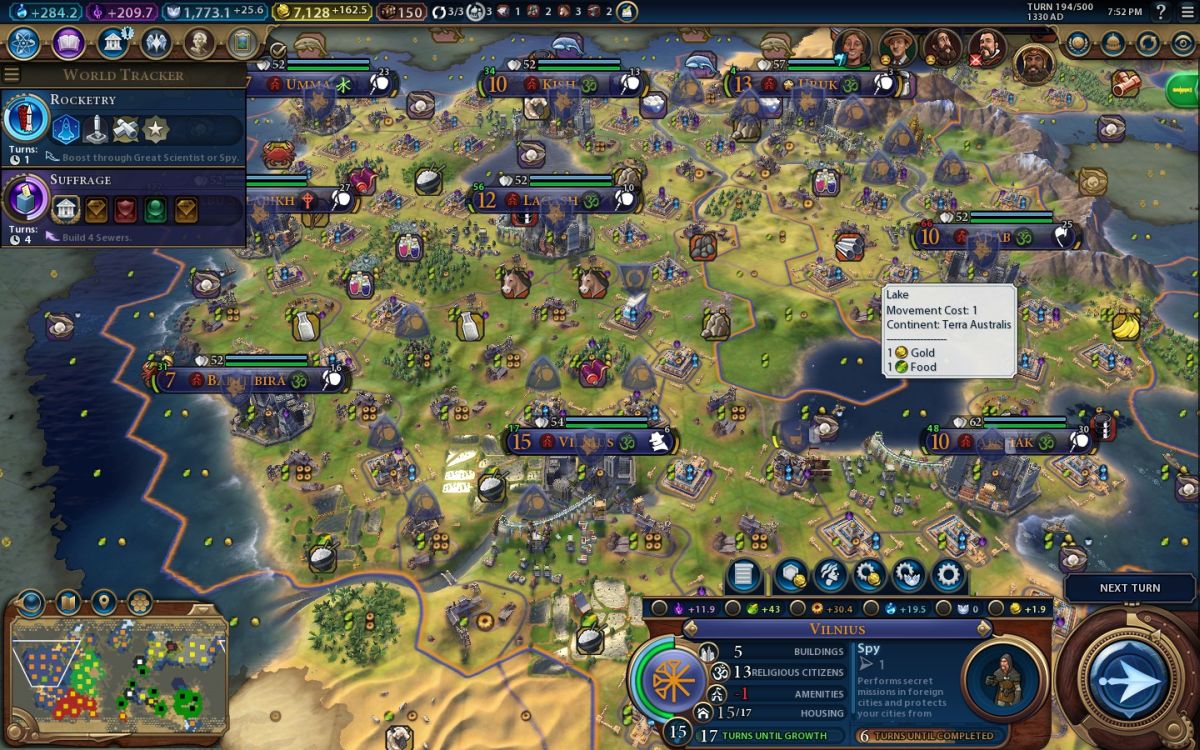
There are two separate tasks that go into winning the spaceship victory in Civ6: researching all of the spaceship techs and then building the actual spaceship parts. The second of these two tasks is no easy feat, with the victory condition requiring the construction of at least one 1800 production Spaceport district, followed by five total spaceship parts costing 900, 1500, 1800, 1800, and 1800 production apiece. The trick to building the spaceship in timely fashion is to recruit various Great People who speed up the construction, with most of the useful ones located at the very end of the tech/civic trees in the Information age. But before doing anything else, I had to build at least one Spaceport district which the Great People do nothing to speed along. I planned to build two Spaceports and split up the construction time on the parts, with one located in Vilnius and one located in my capital of Uruk. I had a whole bunch of excess builders who had been sitting around waiting for the process of Spaceport construction to begin, which would be the time to start converting the local tile improvements from a science/culture focus over to a production focus. Normally I would also reassign a whole bunch of trade routes to my Spaceport city and get lots of extra production from that mechanic, but with only a single trade route available that wasn't going to do much here.
I actually screwed up the planning at Vilnius pretty badly. I should have had some kind of build queue item with a production bonus timed to finish right as Rocketry tech completed, therefore allowing me to chop a forest and overflow into the Spaceport district with the maximum overflow. The spy in production would have been a great choice since I was getting +50% production via Machiavellianism policy. Instead, I completely forgot to do this and was caught flatfooted with a build queue only half finished, whoops. Not my finest hour in terms of planning. The surrounding builders began to chop the remaining forests at Vilnius and also harvest any remaining food resources. There were enough rice and marsh and cattle tiles in the area to get the city all the way up to size 21 before they ran out, allowing Vilnius to work more total tiles. I was replacing the ziggurats with planted new growth forests, Conservation civic having been finished a little while earlier, with lumbermills added on top of them for extra production. With the forest/lumbermill combo, any grassland tile can be turned into 2/3 yield and any plains tile can be converted into 1/4 yield. You can get production from anywhere on the map in Civ6, but only in the lategame once the planting of forests becomes available. (My personal opinion is that this option should be available sooner and I moved up the planting of forests significantly earlier in my theoretical balance mod.)
This was the net effect when my builders were done ten turns later:

The production output of Vilnius increased from 30 per turn to 78 per turn, which unfortunately included the -5% penalty from unhappiness. That was better than I had done in my Poland spaceship game, when I only picked up 66 production/turn from the tiles on the map. However, in that game I also had an additional 16 production from buildings and 126 production from outgoing trade routes, none of which was available in this game. This rate was the best that I could do with all of those other resources off the table. Spaceport construction was going to have to be a bit of a slow and steady walking pace over the next few dozen turns.

I did have this all-star spy helping me out when it came to stealing tech boosts from the AI civs. Meania had picked up the Technologist promotion after her first successful tech steal (making me 2 out of 4 overall), and this promotion granted her fantastic 90% odds on subsequent theft attempts. She would lift several more important tech boosts over the following turns, although she also managed to get herself captured at 3 percent odds towards the end of the game. My luck was not great on the spying dice rolls in this game. I ended up trading away the Iliad Great Work to get her back which was pretty amusing, a priceless cultural artifact handed over in exchange for a captured spy. I had looked at using the Siphon Funds mission since that can sometimes result in massive gold outlays, but the listed amount was never significant enough to be worth trying. The need to land more tech boosts was always more pressing.
In the picture above, note that I had cleared the 10,000 gold mark in my treasury. That was my target goal and I had been saving up towards it for most of the game. I purchased almost nothing with rush-bought gold after the opening turns, saving it for unit upgrades and for Great Person patronage here in the endgame. There were two key things that I had needed to line up before reaching this point in time. The first was to reach Democracy government, as it has the special property of cutting Great Person gold patronage costs in half. I had reached Democracy government a short time earlier on Turn 198, with my civ happily able to complete the normally difficult boost of building four Sewers. The other key thing was that I needed to make sure that I had reached the Atomic age by the time that the next Great Scientist was selected for recruitment. Brazil and Australia were already in the Atomic age, and that meant that if I was also in the Atomic age, the remaining Great Scientists would all come from the next era, the Information age. By picking up Rocketry tech, I had fulfilled this second requirement.
As a result, when Brazil recruited the Atomic era Great Scientist Janaki Ammal, I was able to pounce and snag the first Information era Great Scientist immediately:

Carl Sagan cost a king's ransom of 10,000 gold but that was what I had been saving up to achieve. His specialty ability grants 3000 production towards spaceship parts, instantly completing one of them at a stroke. With Sagan gone, the next Great Scientist that came up was Abdus Salam, the least desirable of the three possibilities for a spaceship game. While his ability of granting boosts for all Information era techs is powerful in its own right, it doesn't do anything to help construct the spaceship. The remaining Great Scientist that hadn't appeared yet was Stephanie Kwolek, who grants +100% production towards spaceship parts. Ideally she would have appeared first and helped boost along the early spaceship parts now under construction in Vilnius. Nevertheless, this wasn't too bad in terms of the order of the draw. I could let Brazil claim Abdus Salam while saving up money and then patronage Stephanie Kwolek when she finally appeared. For the record there are also some Great Engineers that are useful for the spaceship, such as Sergei Korolev's 1500 production charge and Wernher von Braun's +100% production modifier (same as Stephanie Kwolek). However, the AI civs had built few Industrial districts and we had rolled the dud choice of Charles Correa for the current Great Engineer. It was going to take forever for anyone to claim him and advance to the next Engineer, so this looked like a game where it was the Great Scientists or nothing.
There was one shocking development while I was building the spaceship parts and saving up for my next Great Scientist recruitment: an AI leader actually captured a city! 

Philip managed to lose the city of A Coruna to Pedro in a war that they had been fighting. I was stunned when I saw the city change hands on the overworld map. That's something that simply never happens in Civ6, due to the AI's horrendous tactical mismanagement of combat. I think that it's also due to the way that city walls make it so difficult to pull off a successful attack without a battering ram or siege units present, something that the AI never seems to have the intelligence to employ. I always remember an anecdote on this topic from right before Civ6 was released. Firaxis was doing a developer stream of Civ6 two days before the game released, and they were talking about how they had set up thousands of AI vs AI games as a way of testing the gameplay. One of the designers made an offhand comment in response to a Livestream question that the AI had never won by Domination even a single time in their thousands of tests. That comment mostly passed unnoticed but it was a record scratch moment for me. Wait, say what? There's NEVER been a game where a single AI leader crushed everyone else and won by Domination? Did I mishear that?
But no, that actually did prove to be the case in Civ6. The AI can't attack the player successfully outside of the early game cheese rush with free starting units, and what's more, the AI can't even beat other AI leaders at war. No one ever loses cities and the map stays entirely static outside of what the player does. This is particularly weird since the AI was perfectly able to overrun other AI leaders in Civ5, which also used the same One Unit Per Tile system. I remember very well my Art of Wu game where I faced down a runaway France that had already gobbled up England and Germany. By contrast, I've never seen an AI leader conquer another AI leader in Civ6, not even one time. This is another reason why Civ6 Single Player feels unsatisfying, the fact that the player never has to face a runaway, monster AI opponent. Those make for some of the most daring and desperate games, and they're sadly lacking in this incarnation of Civilization.

Here's another chance to highlight more AI tactical stupidity. I found myself in yet another war, with Brazil and Australia launching another joint venture on Turn 227. This looked like it could be highly dangerous over in my Macedonian colonies, where there was a beastly mechanized infantry army running around with a combat strength of 102. Yikes! To defend against that thing, I had, uh, a scout army and some crossbows. I shot the enemy unit with my crossbow army (strength 57) and it did all of 5 damage, barely scratching the paint. Even with the stout city defenses at Hamazi, I would have a hard time holding the settlement against a determined attack. So what did Curtin do with the unit? He walked around in circles for two turns without attacking, and then embarked into the water where he lost all of his defensive strength and the unit could be easily shot to death. 

 I tell you, the combat AI in this game is a freaking moron. They just cannot pose a serious threat to the human player in warfare. And if you can never lose your cities under any circumstances past the early game, well, there's not much challenge to be had.
I tell you, the combat AI in this game is a freaking moron. They just cannot pose a serious threat to the human player in warfare. And if you can never lose your cities under any circumstances past the early game, well, there's not much challenge to be had.
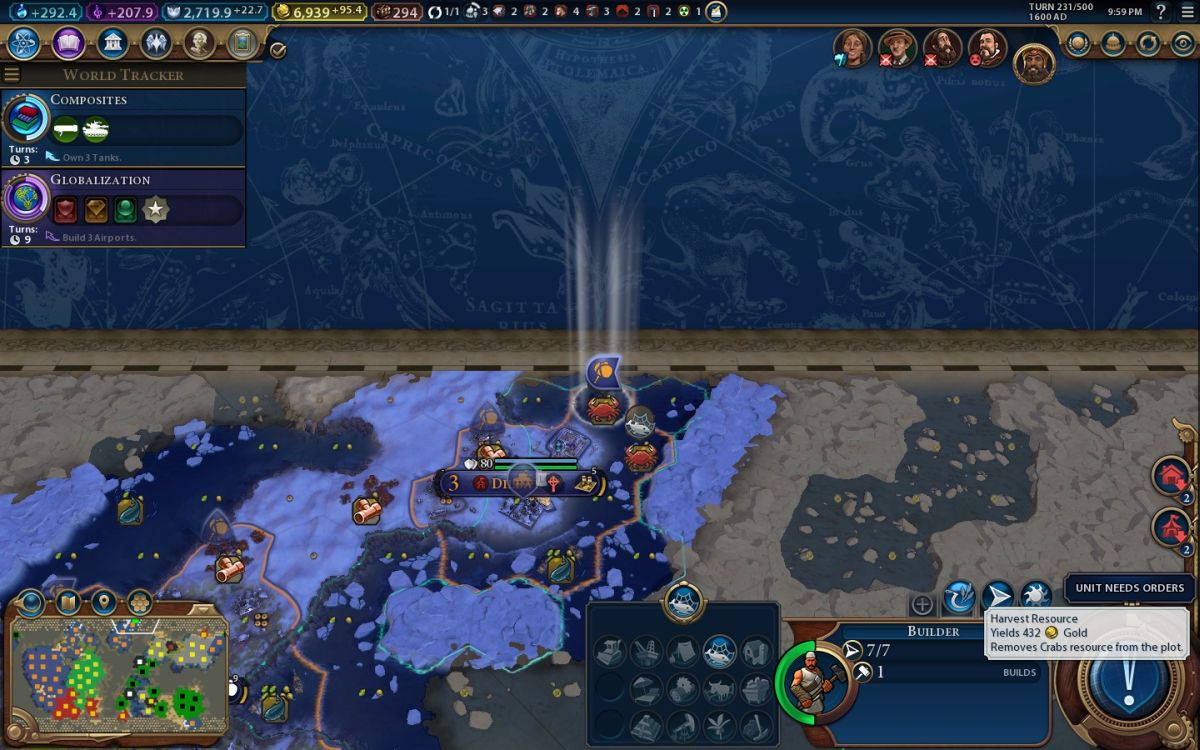
At least the AI does pursue Great People aggressively, that's one of the things that they actually do well in Civ6. Pedro was making good progress towards recruiting Great Scientist Abdus Salam, and I needed to have another 10k gold on hand to snap up Stephanie Kwolek the moment that she became available for hire afterwards. As a result, I decided that this was the right moment to cash in my crab and copper resources by harvesting them en masse. I had a bunch of builders sitting around waiting to claim them, up including in the far north of barbarian island where there were multiple such resources available. This little iceball city had been planted solely for the purpose of harvesting resources, and I cashed in the crabs and coppers at a cool 432 gold apiece. The amount that they are worth scales up over time as more techs/civics are discovered, based on the same formula as forest chops and district costs. In the span of two turns, I havested ten total resources and leaped up to more than 11,000 total gold:

The harvesting of crabs/coppers was a trick that I picked up from our Multiplayer games, first used in the PBEM4 venture and then spread more widely thereafter. With all those harvests in the bank, I'd be ready to recruit the next Great Scientist as soon as she became available. In the meantime, I passed the turns by continuing to sink the Brazilian units that tried to cross the waters of the inner sea. It's not too often that you get to attack a mechanized infantry with a caravel and deal that kind of damage, heh. This was mostly a sham war because Pedro didn't seem too interested in making real attacks against my territory. The Australians were even less inclined to fight, as once again my southern iceball colony next to Canberra failed to see a single attacking unit. After I slaughtered roughly half a dozen Brazilian units over the ten turns of enforced war, Pedro was willing to give me 146 gold/turn for peace. Sure dude, sounds like a deal. Another brilliantly executed war from the Civ6 AI.

By Turn 237, I was nearing the completion of the tech tree. The techs for Telecommunications, Guidance Systems, and Stealth Technology are all skippable since they dead end and don't lead to any of the spaceship parts. The four remaining techs had all been boosted to discount them to half cost, with the Lasers and Nuclear Fusion boosts both in hand due to some excellent spycraft carried out by Meania. In the larger tech race, I had remained essentially tied for first place with Brazil and Australia, unable to pull ahead because my science rate had stagnated once the whole map was full of cities. I couldn't seem to get past roughly 300 beakers, as my cities couldn't grow any further and virtually every flatground tile in my empire already had a ziggurat on it. Fortunately this looked like it would be enough to see me through to the end of the game. I was in the home stretch now and the key remaining challenge was building the spaceship parts, not researching them.

Check out this little tidbit: have you ever seen a builder with a production cost of 426 before? Yeah, maybe I did go a little bit overboard training builders in this particular game. There wasn't a lot else to build though, and if you look at this build queue it should be clear that most everything that I would normally want required a district of some kind. Sure I could build a sewer, but to what point? There were no more tiles to work, and sewers do cost 2 gold/turn in maintenance. Similarly, there was little reason to construct Neighborhood districts which would only occupy a valuable tile that could have gone to a ziggurat instead. Perhaps it would be different if I had more happiness available, but I was reluctant to grow upwards too much further due to the risk of triggering revolts in my cities. I had already pushed far beyond the happiness limit and wasn't keen to experiment with that potential trouble. As a result, I would end up hitting the 450 cost mark for builders before this game was over, meaning that I had trained more than 100 builders in total during this game.
I was checking each turn to see when Pedro would recruit Abdus Salam. Brazil finally claimed him on Turn 238, which allowed me to swoop in and patronage Stephanie Kwolek on the same turn at a cost of 9580 gold:
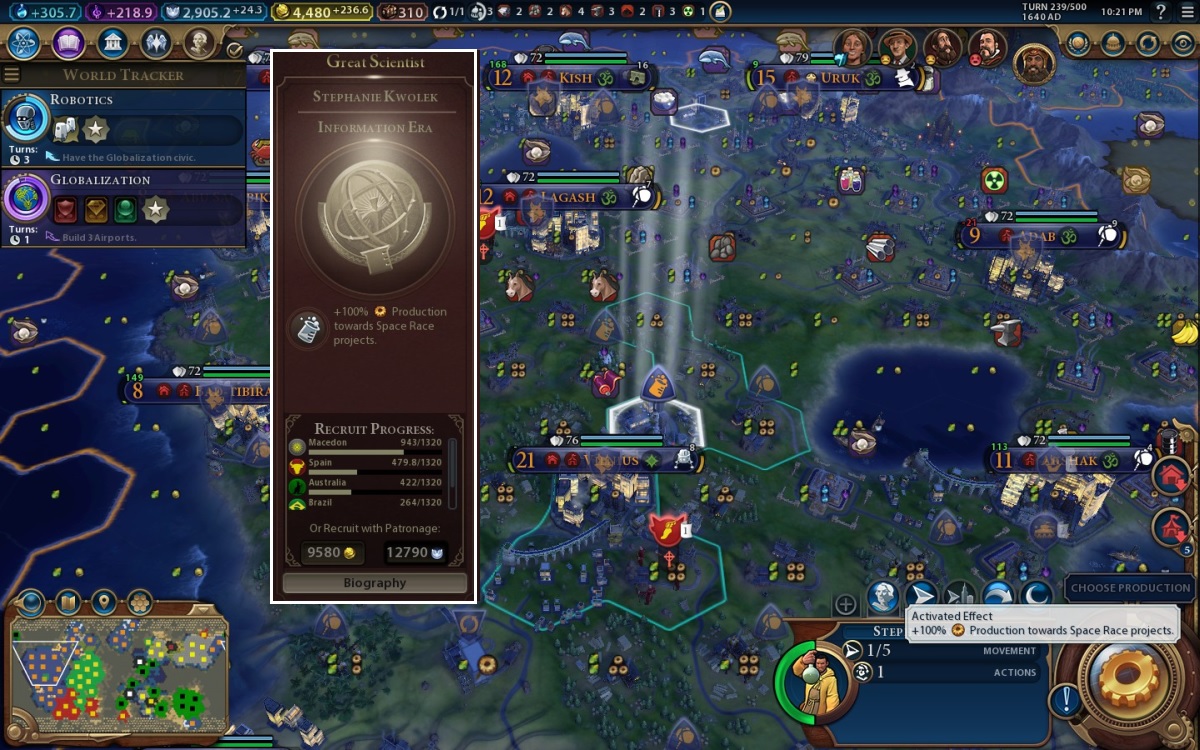
I had been running the 2 Great Scientist points/turn Wildcard policy since I had extra slots in Democracy government, as it was more useful than the alternatives. It was a bit of a shame that Kwolek hadn't been available sooner, as the +100% production bonus on the remaining spaceship parts made a major difference. Vilnius went from an effective rate of 80 production/turn up to 160 production/turn, and the build time for those expensive last three spaceship parts dropped to 12 turns apiece. Now I just needed to finish researching the last few remaining techs and I could combine the production bonus from Kwolek together with the flat 3000 production from Carl Sagan. Those two modifiers do combine together for 6000 production total, enough to overflow and complete the last three spaceship parts on three consecutive turns.
So what I needed to finish things off was more research. When I finally reached the end of the civics tree by picking up Globalization civic, I swapped into these policies:
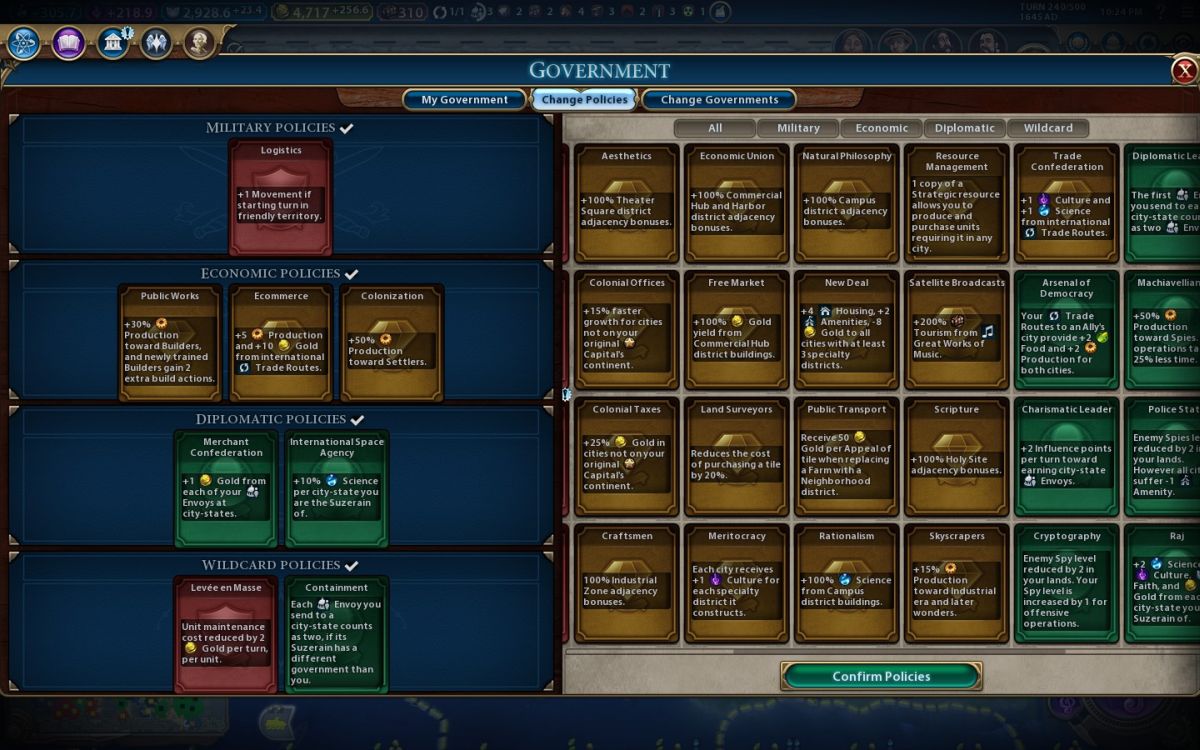
We rarely get to see some of these powerful lategame policies in our Multiplayer games because they arrive so late on the civics tree. Public Works is a combination of Ilkum and Serfdom policies, and I'd been running it ever since it unlocked at Civil Engineering civic earlier in the game. Ecommerce is the most powerful trade route policy available, granting an amazing 5 production and 10 gold to any international trade route. Even with only the one trade route available, it was worth using this policy after I had assigned my trader to Vilnius. There were even useful Diplomatic policies available, with Containment being a sneaky way to steal away city states that have a different civ as their suzerain. I had a whole bunch of envoys saved up and used this policy to take control of two city states. And then there's the best Diplomatic policy in the game, International Space Agency: +10% science for each city state you are the suzerain of. This was the net result of adopting that policy:
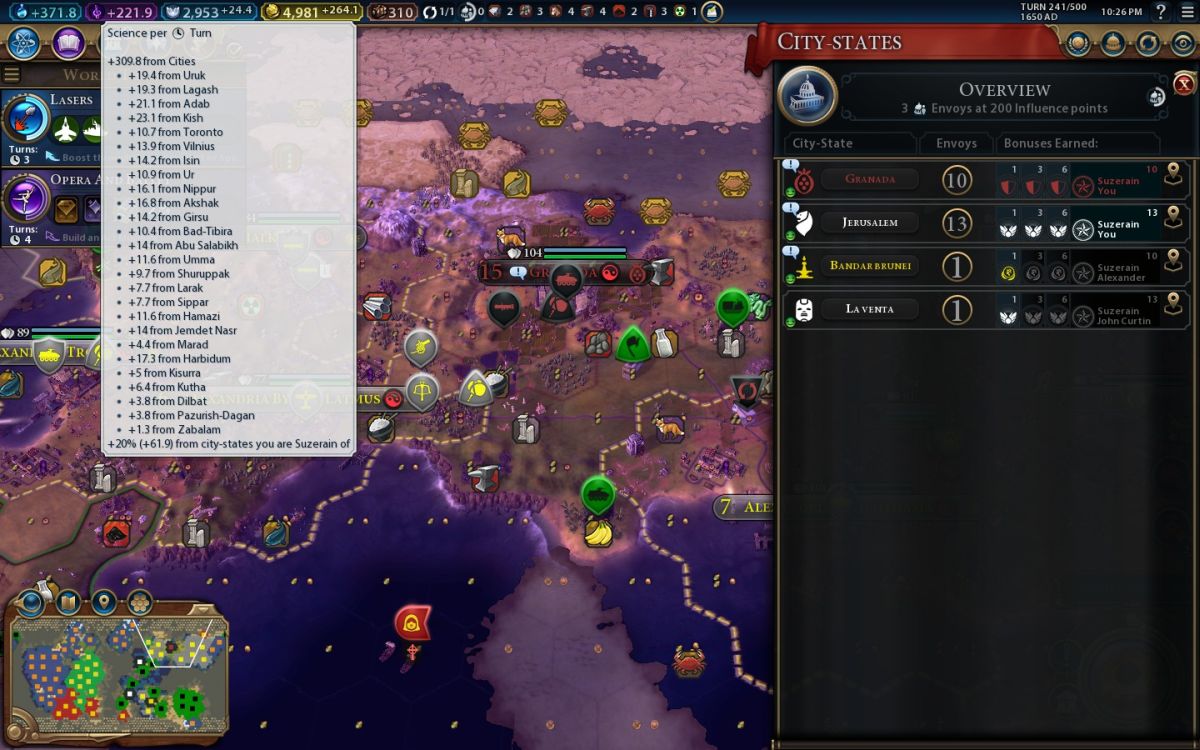
Just like that my beaker output went up to 380 per turn, thanks to the suzerainship of two city states. I was pulling a full 62 beakers/turn from the International Space Agency policy, not bad at all for something in the Diplomatic slot. Ecommerce and International Space Agency are both located at the Globalization civic, quite literally the last one on the tree next to Social Media. It takes forever to reach these policies but they are very powerful indeed once employed.
With my boosted science output, I was prepared to activate Carl Sagan on Turn 245:

This was set up perfectly. I'd use the Great Scientist on this turn to finish the first of the final three spaceship parts, overflow into the second part on Turn 246, and then finish Nuclear Fusion on Turn 247 and overflow into finishing the last spaceship part on the same turn. That's how the mechanics worked in my previous Polish spaceship game, and I had no reason to think that they would have changed. Only it turned out that when I used Sagan, he instantly finished the current spaceship part with no overflow at all. Did I screw this up somehow? No, it turned out that the mechanics had actually changed in recent patches. I did a search at CivFanatics and found that the Great People who provide spaceship production had changed when the expansion came out, and their free production now can only be applied to one spaceship part, with overflow no longer allowed. That was a real disappointment, as I had been looking forward to chaining together the slick 3000 flat production with the +100% modifier for 6000 production and three parts completed on three consecutive turns. This change doesn't even make sense from a numbers perspective as Sagan's 3000 production is far more than the 1800 production cost on the spaceship parts and there's no way to make use of the excess amount getting wasted. Bah! Instead, Carl Sagan would grant me one free spaceship part and I would have to build the other two manually. This was going to delay my finish by about 20 additional turns.
I was hoping to hit next turn a bunch of times and have an uneventful finish to this game. Instead, I was hit by my third joint war declaration of the game, this time from Philip and Pedro:

Those two had fought each other five or six times throughout the game, and yet they were willing to sign a joint war declaration against me. It made no sense at all. Why even have a diplomatic system with all of the relationship modifiers if the AI simply ignores it like this?  It's incredibly annoying how razing a city state could soil my reputation forever while the AIs happily warred with one another all day long to no penalty. Anyway, this was a huge mistake on the part of the AI leaders. Why? Because I had already recruited all of the Great Scientists that I needed, and there was no need to save up gold any longer. That meant that I could do this:
It's incredibly annoying how razing a city state could soil my reputation forever while the AIs happily warred with one another all day long to no penalty. Anyway, this was a huge mistake on the part of the AI leaders. Why? Because I had already recruited all of the Great Scientists that I needed, and there was no need to save up gold any longer. That meant that I could do this:
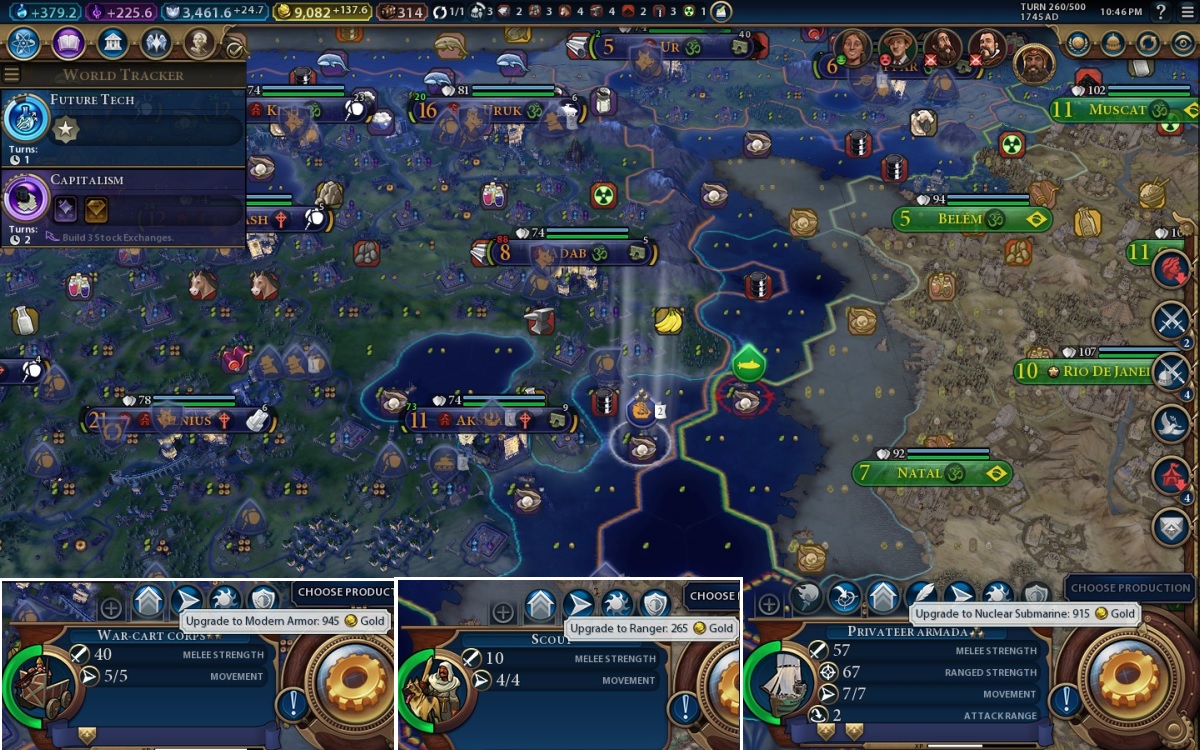
Why yes, I would like to turn my privateer armada into a nuclear submarine armada. Yes, I would like to turn my two dozen scouts into rangers. Yes, I would like to upgrade my war carts and knights into modern armor, and my musketmen into mechanized infantry. Thank you for asking! As we told the Knights Templars back in the Apolyton Demogame, "Oh, sugar, you just gone and done the dumbest thing in your whole life." Freed from the need to husband my funds, I spent myself from 10,000 gold down to less than 4,000 upgrading everything in sight. I took great pleasure in annihilating everything that dared cross over the border into Sumerian territory, and could have moved with ease into Spanish lands if I hadn't barred myself from doing so by variant rule. These AI cretins were true fools and I was glad that my time with them was drawing to a close.
The last part was ready to go at the end of Turn 265:

Vilnius ended up constructing all of the parts. While I did finish a Spaceport in the capital of Uruk, I realized that it couldn't manage to get enough production to build a spaceship part faster than Vilnius could knock them out in succession. If I had managed to land Petra the way that I wanted, I'm sure that I could have divided up the last two parts that weren't completed instantly by Carl Sagan and won about 5-10 turns faster. Oh well, I wasn't trying to race anyone with this finish date. I'm just pleased that it was possible to win at all under the variant restrictions that I had laid out at the beginning. It was a true pleasure to come close to 400 beakers/turn without having a single district on hand.

This was the first time that I'd ever used the Science Victory screen, which usually has nothing of interest to display. I had been tracking the other civs and their progress in the space race, and to the credit of the AI civs they were doing a lot better than I expected here. Pedro and Curtin had both completed the two initial spaceship parts and were working on the final trio. I believe that one of them would have launched in about 20 turns based on the rate at which the bars were filling up, sometime before Turn 300 at least. And that's actually not that bad, good enough to beat most Civ6 players if not any of the true experts. For all of the stupidity that I've been pointing out in this report, the Deity AIs managed to research techs and civics at an impressive pace. I could never leave them decisively behind as I've done at every other difficulty level. Now that may be due to the crazy variant that I was playing, but I don't think it was the whole reason. To their credit, they seemed to do noticeably better on the research front on this difficulty.
Anyway, that's how this one finished up, Spaceship victory on Turn 266. Let me display a couple of the graphs from the endgame screens:
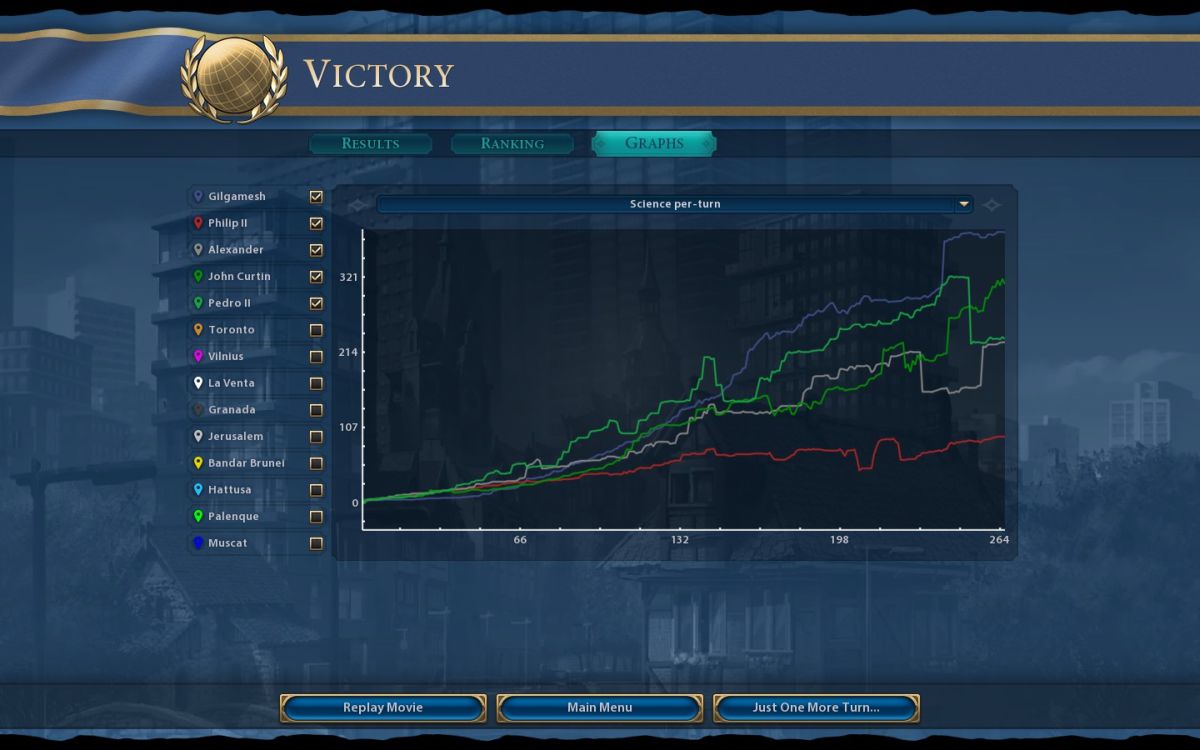
The science per turn graph demonstrates how I took the lead for good right around Turn 150. That date is no coincidence either, as it's when I bushwhacked the Scientific city state of Hattusa and removed it from the playing field. After that, the AI civs were never quite able to take the lead back from my civ, although they came close in the endgame after I stalled out due to a lack of more room to keep expanding. The big jumps at the end of the graph came from civs adopting and likely dropping the Rationalism and International Space Agency policies, the two that do the most to influence science output. While Rationalism was useless for me, the latter policy had a noticeable effect when it finally became available at an extremely late date. The one dud leader on this graph was Philip, who fell off a cliff in terms of science as the game progressed. Like I said before, he doesn't build Campus districts because his AI emphasis causes him to place Holy Site districts instead. He remained somewhat competitive in technology because of the massive cheating that the AI gets on this difficulty level, but was still a full era behind myself and Brazil and Australia by the end.

This graph of the gold balance is hilarious. None of the AIs ever seem to get above 1000 gold since they spend it constantly, while I hoarded gold for most of the game like a miser. Then the graph rises and falls like a rollercoaster as I spent 10k gold to recruit two Great Scientists, with the mass harvest of crabs/coppers in the middle. Quite a wild ride there for my treasury's account balance.

And finally, the total districts constructed graph that demonstrates my lack of any specialty districts. Note that Aqueducts and Spaceports do not show up on this graph, as neither one is considered to be a specialty district by the game's coding. Oddly enough, my Sumerian civ shows up with one district on this graph, and I was struggling to figure out how that could be the case when I suddenly remembered what it had to be: Hattusa. When I captured the city state, the game must have registered the Campus district inside as a "constructed" district, and the fact that I razed the city immediately afterwards did not remove that district from the tally. That's an artifact of how the game tracks districts though, and not an actual blemish on my record. I razed Hattusa immediately and never had an actual specialty district of any kind in my empire. It looks like Australia had the clear lead among the AI civs for most districts built, which may be a reason why Curtin seemed to be one of the strongest AI leaders in terms of performance. He was the only one close to me in score at the end of the game, 604 points to my 608 points, and the next-closest AI was Pedro at 534 points. Alexander and Philip were far, far behind in score when the game concluded.
Let's finish this report with a big picture summary of Civ6 as a Single Player game. The mechanics in this game are quite good overall, and while it's true that chopping/harvesting abuse overflow becomes too powerful in the later stages of the gameplay, the whole system nevertheless represents a gigantic improvement over Civ5. Expansion is back to being the rule of the day, the social policies create deep and interesting gameplay, the city state envoy system is a massive improvement, the districts and their adjacency bonuses are a novel spin on city development, and even the combat system has a surprising amount of tactical depth to it. If you were going to create a One Unit Per Tile setup for Civilization, this is probably about as well as it can be done.
Unfortunately, the One Unit Per Tile rules ultimately still cause the downfall of Civ6 as a game. The basic problem is that the AI doesn't understand this system, not even a little bit, and the complete inability of the AI to play its own game undercuts everything else. The AI civs are completely unable to threaten the human player after the early game cheese rush, and this removes virtually all of the tension from the gameplay. If you can never be conquered no matter what, where's the danger and the excitement? The complexity of the district system also has the unfortunate side effect of making the economic side of the gameplay too difficult for the AI to understand, and as a result the AI can't pose a credible challenge in terms of peaceful development either. Deity difficulty is the only time that I've ever failed to blow away the AI civs in research; on all other difficulties they quickly fall behind and never catch up. Therefore we have a game with interesting, solid mechanics... and an AI that miserably fails at them on every level. The AI can't mount a successful attack against the player, the AI can't mount a successful attack against other AIs, and the AI can't develop its own empire. The net result is a Single Player setup that feels barebones and lacking, with even the highest difficulty level failing to provide much of a challenge. Deity difficulty in Civ6 is roughly equivalent to Emperor difficulty in Civ4, or maybe even Monarch difficulty. There just isn't enough here to challenge skilled players.
This is a real disappointment since Civ6 does so many things well. The designers went and built this interesting and fun game but neglected to come up with an AI capable of playing it. This problem is exacerbated to an even greater degree in the Rise and Fall expansion, which goes in precisely the wrong direction by introducing even more "cool features" that the AI has no clue how to use. (They also completely broke the gameplay by introducing the Magnus governor, who turns the whole game into who can exploit chop/harvest mechanics the hardest. I recommend avoiding the expansion; the non-expansion gameplay is simply better.) Overall then, Civ6 is still a good game and I'm glad that I had the opportunity to play it. I was able to get two years worth of content out of this one, and that's money well spent. But due to its flawed AI and its abysmally bad user interface (which I've barely discussed here since I'm used to it by now), it's an inferior product to Civ4, and even inferior to Civ3 given that the game came out 15 years later. I firmly believe that for the Civilization series to make further progress, it needs to ditch the One Unit Per Tile rules and go back to being a strategic game instead of a tactical one. We'll see what they come up with in Civ7, whenever that might be.
Until then, thanks as always for reading. There would be no point to creating these reports if there was no one around to read them. 



